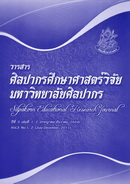การพัฒนารูปแบบการสอนโดยใช้กรณีศึกษาทางศาสตร์การเรียนการสอน เพื่อส่งเสริมความสามารถด้านการคิดอย่างมีวิจารณญาณของนักศึกษาวิชาชีพครู
บทคัดย่อ
บทคัดย่อ
การวิจัยนี้มีวัตถุประสงค์เพื่อพัฒนารูปแบบการสอนโดยใช้กรณีศึกษาทางศาสตร์การเรียนการสอน เพื่อส่งเสริมความสามารถด้านการคิดอย่างมีวิจารณญาณของนักศึกษาวิชาชีพครู และศึกษาประสิทธิภาพเชิง ประจักษ์ของรูปแบบที่พัฒนาขึ้น เป็นการวิจัยและพัฒนา(Research and Development) กำหนดรูปแบบการ ทดลองแบบหนึ่งกลุ่มทดสอบก่อน และหลังการทดลอง (One–Group Pretest Posttest Design) กลุ่ม ตัวอย่าง คือ นักศึกษาชั้นปีที่ 5 สาขาวิชาการประถมศึกษา คณะศึกษาศาสตร์ มหาวิทยาลัยศิลปากร จำนวน 23 คน เครื่องมือที่ใช้ในการวิจัย ประกอบด้วย แผนการจัดการเรียนรู้ แบบวัดความสามารถด้านการคิดอย่าง มีวิจารณญาณ แบบประเมินคุณลักษณะ และแบบสอบถามความพึงพอใจ วิเคราะห์ข้อมูลโดยใช้ค่าร้อยละ (%) ค่าเฉลี่ย ( ) ส่วนเบี่ยงเบนมาตรฐาน (S.D.) การทดสอบค่าที (t-test) และการวิเคราะห์เนื้อหา (Content Analysis)
ผลการวิจัยสรุปว่ารูปแบบการสอนที่พัฒนาขึ้นชื่อว่าพีซีเอสเอสซี (PCSSC Model) มี 4 องค์ประกอบ คือ หลักการ วัตถุประสงค์ กระบวนการเรียนการสอน และเงื่อนไขของการนำรูปแบบการสอนไปใช้ สำหรับ กระบวนการเรียนการสอนมี 5 ขั้นตอน ประกอบด้วย ขั้นเตรียมการเรียนรู้(Preparation) ขั้นนำสู่กรณีศึกษา (Case Presentations) ขั้นสรรหาวิธีการแก้ไข (Selection of Solutions) ขั้นแบ่งปันประสบการณ์ (Sharing with Groups) และขั้นสืบสานสร้างความรู้ใหม่ (Construction for New Knowledge) การทดลองใช้ รูปแบบการสอน พบว่า นักศึกษาวิชาชีพครูมีความสามารถด้านการคิดอย่างมีวิจารณญาณสูงขึ้นอย่างมีนัย สำคัญทางสถิติที่ระดับ .05 นักศึกษาวิชาชีพครูมีคุณลักษณะของผู้ที่มีการคิดอย่างมีวิจารณญาณอยู่ในระดับ สูง และนักศึกษาวิชาชีพครูมีความพึงพอใจต่อรูปแบบการสอนที่พัฒนาขึ้นโดยภาพรวมในระดับมาก
Abstract
This research aimed to develop an instructional model based on pedagogical case studies to enhance student teachers’ critical thinking skills and empirically examine effectiveness of the model. The participants were 23 student teachers majoring in Elementary Education in Faculty of Education at Silpakorn University. The research instruments were based on pedagogical case studies lesson plans, a critical thinking test and a satisfaction questionnaire. The obtained data was analyzed by mean, percentage, standard deviation, dependent t-test and content analysis.
The research results were 1) The instructional model based on pedagogical case studies for enhancing student teachers’ critical thinking ability was named “PCSSC Model”. It consisted of 4 components : principles, objectives, processes and conditions for implementation. The processes was comprised of 5 phases: 1. Preparation, 2. Case Presentations, 3. Selection of Solutions, 4. Sharing with Groups, and 5. Construction for New Knowledge. 2) The results of PCSSC Model implementation revealed that student teachers’ critical thinking skills before and after the implementation of the model was significantly different at the level of .05. Student teachers’ traits as critical thinkers after the implementation of the model were at the high level. and the student teachers’ satisfaction with the instructional model was at the high level.





